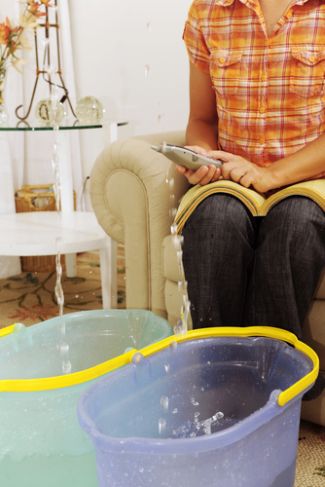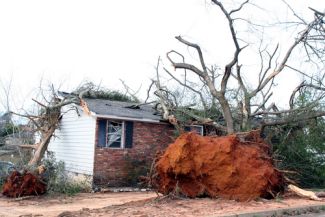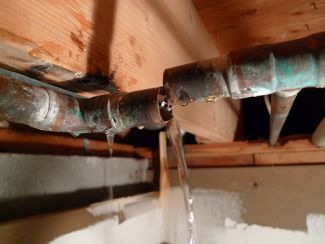Water Damage Cleanup, Part 1 - Safety Issues

Water damage can range from small, easy-to-fix problems to disasters that ruin entire homes. So, what should you do if water damage strikes your house? Read our tips below.
As soon as you find out about water damage in your home, do two things immediately: contact your insurance company to notify them of the damage, and also assess whether it is safe to be inside your home.
Call Your Insurance Company
Get in touch with your homeowner's insurance company to find out what is covered by your policy and determine if they can help in the clean up process. Keep in mind, water and mold damage are not always covered by homeowner's policies, so of course, it is always a good idea to verify the exact coverage of these events each time you start or renew a policy.
Electric, Oil, and Gas Risks
Water damage often creates a risk of electrical shock inside a home. If you have any standing water, then there is a chance that circuit breaker boxes, electric outlets, or live wires are submerged, posing serious risks. If there is any chance that electrical components are submerged, do not enter the house.
Have your utility company turn off power to your home. Then, shut off power locally in your house as well, in case the utility company mistakenly turns the power back on while you are still working. It is a good idea to have an electrician assess whether it is safe to be in your home, since you do not want to wade into standing water until you are absolutely sure there is no risk of electric shock.
Similarly, turn off your fuel oil, natural gas, or propane lines, and shut off any individual lines to each of the corresponding appliances as well. This is important, because if you had a large amount of standing water in your home, it could have shifted your appliances or loosened connection lines, potentially creating leaks. Once you have determined that it is safe to be in your house, check these items for damage, along with your water heater and similar appliances.
 Structural Damage
Structural Damage
Take note of what caused the water damage. Did a fallen tree tear a hole in your roof, did a pipe burst inside the house, or is a toilet or sink overflowing? Look for signs of danger in the water damaged area and at the source of the damage.
In particular, look for any structural damage to your home. Signs of structural damage could include buckling floors, bulging ceilings, or any evidence of weakness in weight bearing components of your home. Make sure your foundation walls are not damaged, especially if a lot of water is standing in your basement.
If there is the slightest sign of structural damage or a large amount of standing water in your home, have a professional water damage expert help you assess whether it is safe to be in your house.
Water Contamination
Additionally, consider whether the source of the water damage is dangerous. A clean water source, like a sink overflow, is unlikely to pose a health risk. However the source might be grey water, like a toilet bowl overfilling, or even black water containing sewage.
 Grey water could contain contaminants, and black water certainly does. If contaminated water caused the damage, vacate the premises and have a professional water damage expert clean it up.
Grey water could contain contaminants, and black water certainly does. If contaminated water caused the damage, vacate the premises and have a professional water damage expert clean it up.
Protect Yourself
As you assess the extent of your water damage and work on cleaning it up, protect yourself from bacteria and infection by wearing watertight gloves, clothing, and boots. Also, in case of emergency, be sure to have another person with you while you are working.
Clean Up
Read part 2 of this article, to learn about water damage repair.
Image source: thirteenofclubs
 The Water Damage Cleanup, Part 1 - Safety Issues by Water Damage Defense, is licensed under a Creative Commons Attribution-ShareAlike 3.0 Unported License.
The Water Damage Cleanup, Part 1 - Safety Issues by Water Damage Defense, is licensed under a Creative Commons Attribution-ShareAlike 3.0 Unported License.

 Structural Damage
Structural Damage